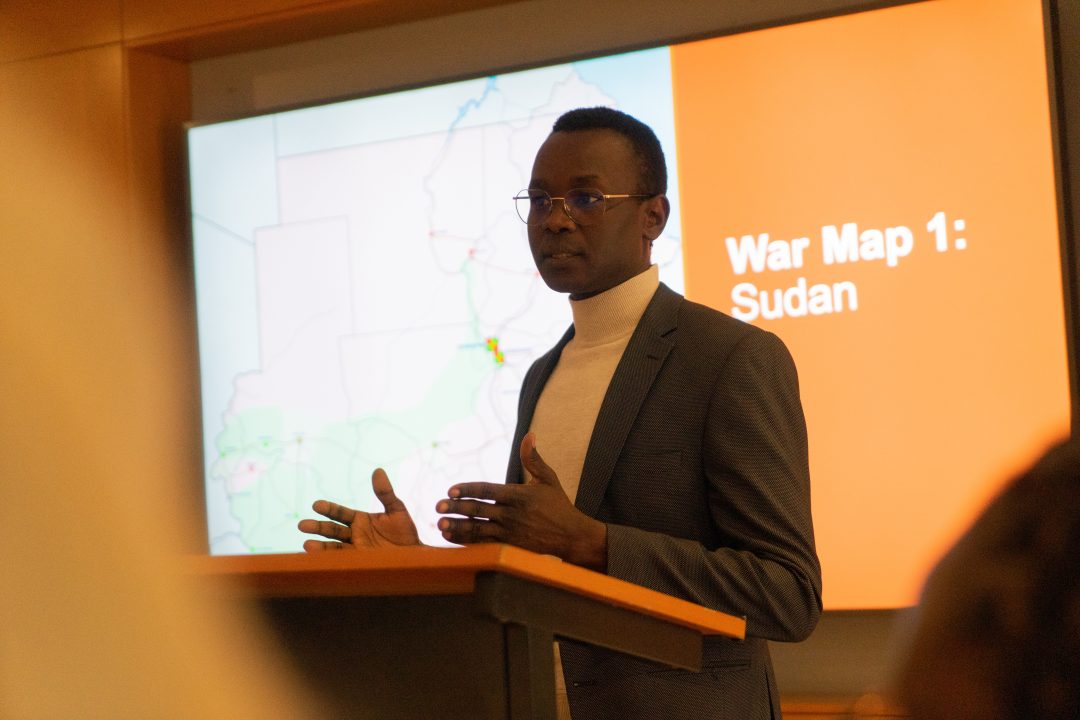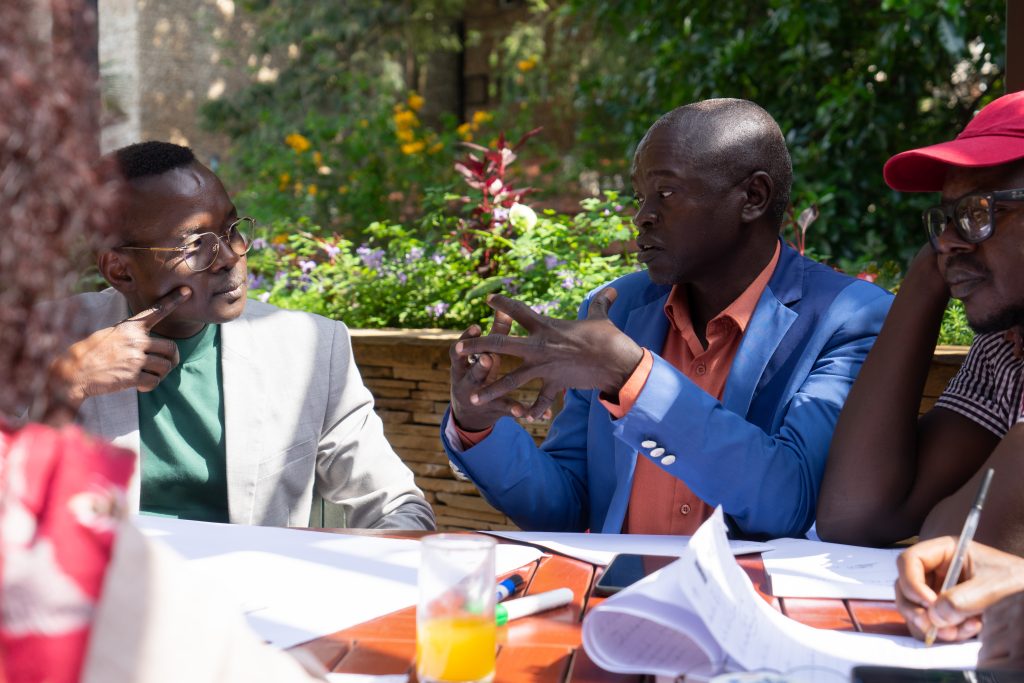Expert Meeting: Documenting international crimes and human rights violations for future accountability purposes
With the financial support of the German Federal Foreign Office and the Ministry of Foreign Affairs of the Netherlands.
17-18 May 2023, Nairobi, Kenya
Click here for the expert meeting pictures.
The Wayamo Foundation hosted an expert meeting on 17-18 May in Nairobi, Kenya, on the documentation of international crimes and human rights violations for future accountability purposes. The meeting explored how best to use existing open-source information (OSI) collection mechanisms in the context of the current armed conflict in Sudan. Civil society representatives, human rights defenders, and journalists from the Sudanese diaspora were invited to exchange their views with high-level experts from the International, Impartial and Independent Mechanism for Syria (IIIM), the Sudanese Archive, the International Residual Mechanism for Criminal Tribunals, the Africa Group for Justice and Accountability (AGJA), and members of past and current International Commissions of Inquiry.
The meeting, held under Chatham House rules, was moderated by Mikel Delagrange, Mark Kersten and Kris Kotarski, all from the Wayamo Foundation. The proceedings were officially opened by Wayamo Foundation Executive Director, Bettina Ambach, who noted in her opening remarks that “with the outbreak of the armed conflict in Sudan on 15 April between the Sudanese Armed Forces and the Rapid Support Forces Civil, everything has changed.” She went on to emphasise that, despite the current state of affairs, there were still tools that could enable the participants to be proactive, even in the midst of war. Reiterating the important role that civil society actors play, Ms Ambach stated, “CSO actors are often the first ones on the ground, long before competent investigative authorities come into the picture. Their access to affected communities, combined with their collective expertise and ability to swiftly share information, places them in a privileged position to do the work. They may do so by collecting information that may otherwise be lost, and by accessing, verifying and analysing information which can subsequently prove crucial in contributing to accountability efforts.” She further emphasised that CSO actors also have a responsibility to ensure that principles, such as “Do no harm” and obtaining informed consent, among others, are observed while conducting their work. Ms. Ambach further explained that the Nairobi meeting would zoom in on the topic of OSI, stressing the fact that large quantities of publicly available digital information are increasingly used in efforts to document human rights violations for future court proceedings. She concluded by acknowledging the extremely difficult circumstances in which the Sudanese participants find themselves, with the constant fear that family members or friends may be hurt. She appreciated their taking the time to attend the meeting in Nairobi and their commitment to justice and accountability efforts in Sudan.
Over the course of the meeting, discussions were held on key topics, including evidence–gathering, the prioritisation of resources in open-source investigations, and the ensuing security implications of and considerations for OSI collection. Speakers included Sudanese civil society actors and human rights defenders, such as Moneim Adam, Access to Justice Programme Director, Gisa INC, and human rights activist, Elbashir Idris.
An in-depth review of OSI was shared by representatives from Mnemonic (the parent organisation of Sudanese Archive), namely, executive director Hadi al-Khatib and legal adviser Libby McAvoy. International perspectives from international courts, investigative mechanisms and international law experts were shared by Catherine Marchi-Uhel, Head of the IIIM for Syria, Serge Brammertz, Chief Prosecutor of the International Residual Mechanism for Criminal Tribunals, and Nema Milaninia, Special Advisor to the U.S. Ambassador-at-Large for Global Criminal Justice.
On the second day of the expert meeting, a dedicated session was held with eminent AGJA experts in international criminal justice and human rights, on the role of UN commissions of inquiry and national human rights commissions in the collection and preservation of evidence. AGJA members Mohamed Chande Othman, Chairperson of the Commission of Human Rights Experts on Ethiopia, former Chief Justice of Tanzania (AGJA member on hiatus), Aïchatou Mindaoudou, Former United Nations Special Representative in Côte d’Ivoire, former Acting Joint UN/AU Special Representative in Sudan Darfur, and former Minister of Foreign Affairs, Niger, Betty Murungi, transitional justice expert, Advocate of the High Court of Kenya, Navi Pillay, former UN High Commissioner for Human Rights and Chair of the UN Commission of Inquiry on the Occupied Palestinian Territory, including East Jerusalem, and Israel, and Fatiha Serour, former Deputy Special Representative of the UN Secretary General in Somalia and AGJA Chairperson, gave examples drawn from their rich store of experience and discussed how OSI might contribute to future investigative panels and commissions of inquiry. The meeting closed with a group exercise that examined key areas of focus and resource-allocation for open-source investigations in the context of the armed conflict in Sudan.
The expert meeting was well received by the participants, who shared the following observations in their evaluations:
In the session on monitoring and documenting human rights violations in Sudan: The Sudanese Archive and role of civil society, participants had this to say:
- It was really great to see the end result of open-source investigations. I am happy to know that civilian efforts are not in vain but contribute to national and international justice mechanisms.
- I think documenting human rights violations in a systematic way is very important. Different civil society actors need to collaborate on the creation of databases of war crimes and human rights violations in Sudan. Further training is also necessary for journalists and civil society on how to document and use open-source information in a systematic way.
In the session on OSI-collection: Future proofing and security implications, participants stated:
- I liked and appreciated the session, since open-source information has become a priority for me since the outbreak of the conflict, and unlike the 2021 coup days with limited internet and posts, this situation is much grander in scale. I will be taking my notes home to analyse and brainstorm new strategies based on this.
In conclusion, when commenting on the overall usefulness of the workshop, all the participants gave it the highest possible rating (5, very useful).
The expert meeting concluded by stressing the advisability of creating a single central repository of digital open-source evidence on human rights violations in Sudan. A follow-up meeting to build on the momentum gained on open-source investigations is planned for September.
With an eye on current events in Sudan, the Wayamo Foundation hosted a series of events from 17-20 May 2023 in Nairobi, Kenya.







